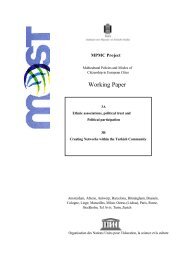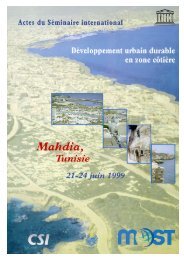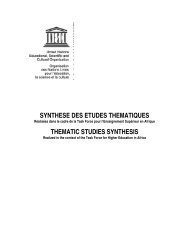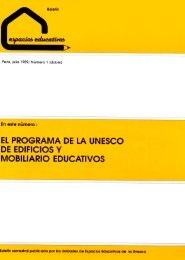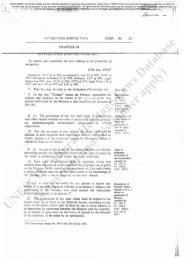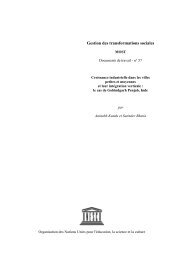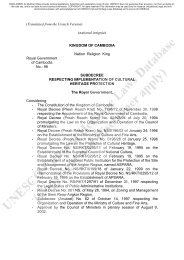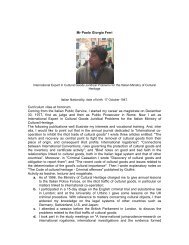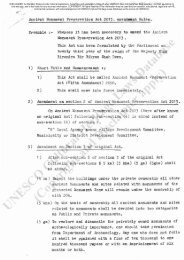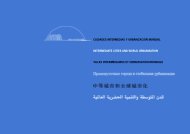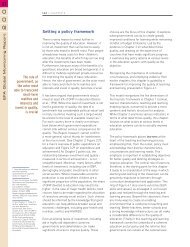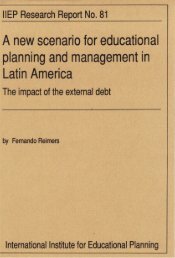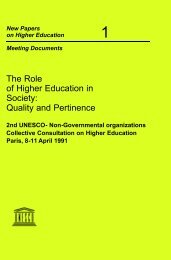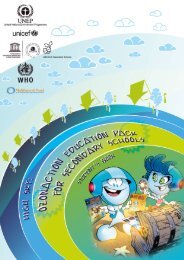Chapter 2. Progress towards the EFA goals - Unesco
Chapter 2. Progress towards the EFA goals - Unesco
Chapter 2. Progress towards the EFA goals - Unesco
You also want an ePaper? Increase the reach of your titles
YUMPU automatically turns print PDFs into web optimized ePapers that Google loves.
PROGRESS TOWARDS THE <strong>EFA</strong> GOALS<br />
Youth and adult literacy<br />
Box <strong>2.</strong>21: Brazil — ‘making people literate’<br />
Around 14 million Brazilian youth, adults and elderly<br />
people lack basic reading and writing skills. The<br />
Literate Brazil Programme (Programa Brasil<br />
Alfabetizado) initiated by President Luiz Inácio Lula<br />
da Silva in 2003 is <strong>the</strong> first concerted national effort<br />
to consign illiteracy to <strong>the</strong> history books.<br />
The programme is coordinated by <strong>the</strong> Ministry of<br />
Education but operates through a highly decentralized<br />
structure. It functions in 3,699 municipalities, just<br />
over 1,000 of which have been accorded priority<br />
status because <strong>the</strong>y have illiteracy rates over 25%.<br />
The effort primarily targets disadvantaged groups<br />
such as indigenous people, small farmers and farm<br />
workers, child labourers (as part of <strong>the</strong> Programme<br />
to Eradicate Child Labour) and people covered under<br />
<strong>the</strong> Bolsa Familia social protection programme.<br />
Literate Brazil is open to anyone over 15 with less than<br />
a year of education. Thus far it has provided literacy<br />
training to about 8 million learners. Literacy classes<br />
typically last six to eight months and are attended<br />
by groups of eighteen to twenty-five learners. Federal<br />
transfers cover <strong>the</strong> cost of training and providing<br />
grants to literacy facilitators, many of whom are<br />
teachers. Literacy textbooks are produced in local<br />
languages and reflect local circumstances and needs.<br />
Innovative pedagogical approaches have been<br />
developed. Teaching is organized around <strong>the</strong> idea<br />
of ‘making people literate’ through dynamic learning<br />
processes that lead to <strong>the</strong> acquisition of reading,<br />
writing and numeracy skills. Students’ abilities are<br />
assessed and recorded by government agencies,<br />
and qualifications are provided that can be used<br />
to enter formal education.<br />
Literate Brazil has been about more than providing<br />
services. Political leaders have challenged <strong>the</strong> culture<br />
of silence and indifference surrounding illiteracy.<br />
A Ministry of Education programme has put <strong>the</strong><br />
development of textbooks for literacy, a previously<br />
neglected subject, on <strong>the</strong> same footing as books for<br />
primary and secondary school. Prizes are awarded<br />
for <strong>the</strong> development of literacy materials and <strong>the</strong> best<br />
entries are integrated into national programmes, with<br />
specific prizes for black Brazilians, an educationally<br />
disadvantaged group.<br />
Sources: Brazil Ministry of Education (2008);<br />
Henriques and Ireland (2007); Ireland (2007, 2008);<br />
UIL (2009); UNESCO Brasilia (2009).<br />
Many literacy programmes also continue to suffer<br />
from low rates of uptake and completion.<br />
On <strong>the</strong> o<strong>the</strong>r hand, programmes that provide for<br />
active learning through a relevant curriculum and<br />
offer follow-up have achieved results. Many such<br />
programmes are built on partnerships, extending<br />
from local communities to non-government actors<br />
and government agencies. One prominent<br />
example is Reflect. Developed and coordinated<br />
by ActionAid, an international charity, it focuses<br />
on <strong>the</strong> learners’ own literacy objectives, motivation<br />
and skills (Riddell, 2001). It not only promotes <strong>the</strong><br />
use of real texts from <strong>the</strong> environment but also<br />
encourages participants to generate <strong>the</strong>ir own<br />
texts. It fur<strong>the</strong>r aims to transform <strong>the</strong> broader<br />
literacy environment, for example by campaigning<br />
for newspapers to use local language or texts more<br />
accessible to adult literacy learners (Aderinoye<br />
and Rogers, 2005). The programme is currently<br />
applied in Bangladesh, Pakistan and many o<strong>the</strong>r<br />
countries (Duffy et al., 2008).<br />
Bilingual education is critical to <strong>the</strong> success of<br />
literacy programmes aimed at indigenous people<br />
and ethnic minorities. Here, too, many governments<br />
have openly acknowledged <strong>the</strong> mistakes of <strong>the</strong> past.<br />
Several governments in Latin America – including<br />
those of Chile, Guatemala, Mexico, Paraguay and<br />
Peru – and <strong>the</strong> UN Economic Commission for Latin<br />
America and <strong>the</strong> Caribbean have developed a<br />
regional poverty reduction strategy incorporating<br />
bilingual literacy training for indigenous groups<br />
(Latin American and <strong>the</strong> Caribbean Demographic<br />
Center, 2009; Stockholm Challenge, 2008).<br />
Conclusion<br />
Much has been achieved through <strong>the</strong> scaling up<br />
of literacy initiatives since 2000. However, <strong>the</strong><br />
monitoring evidence is unambiguous: <strong>the</strong> 2015<br />
targets will not be reached on <strong>the</strong> current<br />
trajectory. Far more has to be done to accelerate<br />
progress. This will require stronger political<br />
leadership. Governments across <strong>the</strong> world continue<br />
to attach too little weight to literacy in national<br />
planning. This is short-sighted. Illiteracy imposes<br />
huge costs on society and <strong>the</strong> economy – and<br />
investments in literacy have <strong>the</strong> potential to<br />
generate large returns in both areas.<br />
The Literate Brazil<br />
Programme has<br />
provided literacy<br />
training to about<br />
8 million learners<br />
103



